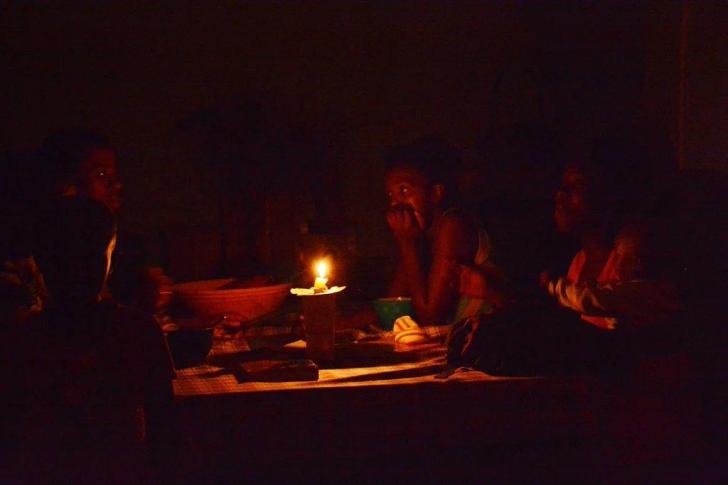News / National
Zimbabwe and Zambia suffer simultaneous blackouts
25 Nov 2024 at 19:35hrs |
7 Views

Zimbabwe and Zambia experienced nationwide blackouts on Sunday night, a disruption believed to be caused by a surge on power lines connecting the two countries to South African power utility Eskom.
The outages occurred within minutes of each other, with Zambia losing power at 8:15 PM and Zimbabwe following at 8:25 PM.
Zimbabwe Electricity Supply Authority (ZESA) confirmed the incident, stating, "The national grid experienced a system disturbance resulting in a nationwide blackout." Similarly, Zambia's state power company, ZESCO, attributed the outage to a "power system disturbance… leading to loss of power supply that has affected the whole country."
Restoration Efforts Underway
By early Monday morning, ZESA reported significant progress in restoring power. "The restoration process began immediately, and we are happy to advise that as of this morning, most of the load centers (regional substations) have been picked countrywide," the company said in a statement.
Power in most parts of Zimbabwe was restored by 3 AM on Monday, bringing relief to citizens who had been plunged into darkness.
The Cause of the Blackout
Sources within ZESA revealed that the outage likely stemmed from a power surge along transmission lines from South Africa, through which both Zimbabwe and Zambia import electricity from Eskom. Zambia, which faces a more severe power crisis, has ramped up its imports to address its significant power deficit.
Eyewitnesses across both countries described the power flickering multiple times before going out completely, indicating instability in the supply system before the total failure.
Ongoing Power Challenges
The blackouts come amidst persistent power generation challenges in both nations. Zimbabwe and Zambia rely heavily on the Kariba hydroelectric plant, which has faced reduced generation capacity due to low water levels.
In Zimbabwe, ageing thermal power stations frequently break down, leaving citizens enduring daily power cuts lasting up to 18 hours. Zambia has similarly struggled to meet demand, with frequent outages disrupting businesses and households.
Sunday's blackout underscores the fragile state of the power infrastructure in the region, which is heavily dependent on shared resources and vulnerable to systemic disturbances. Efforts to strengthen grid resilience and diversify power generation remain crucial for both countries as they navigate their ongoing energy crises.
The outages occurred within minutes of each other, with Zambia losing power at 8:15 PM and Zimbabwe following at 8:25 PM.
Zimbabwe Electricity Supply Authority (ZESA) confirmed the incident, stating, "The national grid experienced a system disturbance resulting in a nationwide blackout." Similarly, Zambia's state power company, ZESCO, attributed the outage to a "power system disturbance… leading to loss of power supply that has affected the whole country."
Restoration Efforts Underway
By early Monday morning, ZESA reported significant progress in restoring power. "The restoration process began immediately, and we are happy to advise that as of this morning, most of the load centers (regional substations) have been picked countrywide," the company said in a statement.
Power in most parts of Zimbabwe was restored by 3 AM on Monday, bringing relief to citizens who had been plunged into darkness.
The Cause of the Blackout
Sources within ZESA revealed that the outage likely stemmed from a power surge along transmission lines from South Africa, through which both Zimbabwe and Zambia import electricity from Eskom. Zambia, which faces a more severe power crisis, has ramped up its imports to address its significant power deficit.
Eyewitnesses across both countries described the power flickering multiple times before going out completely, indicating instability in the supply system before the total failure.
Ongoing Power Challenges
The blackouts come amidst persistent power generation challenges in both nations. Zimbabwe and Zambia rely heavily on the Kariba hydroelectric plant, which has faced reduced generation capacity due to low water levels.
In Zimbabwe, ageing thermal power stations frequently break down, leaving citizens enduring daily power cuts lasting up to 18 hours. Zambia has similarly struggled to meet demand, with frequent outages disrupting businesses and households.
Sunday's blackout underscores the fragile state of the power infrastructure in the region, which is heavily dependent on shared resources and vulnerable to systemic disturbances. Efforts to strengthen grid resilience and diversify power generation remain crucial for both countries as they navigate their ongoing energy crises.
Source - zimlive
Join the discussion
Loading comments…

























